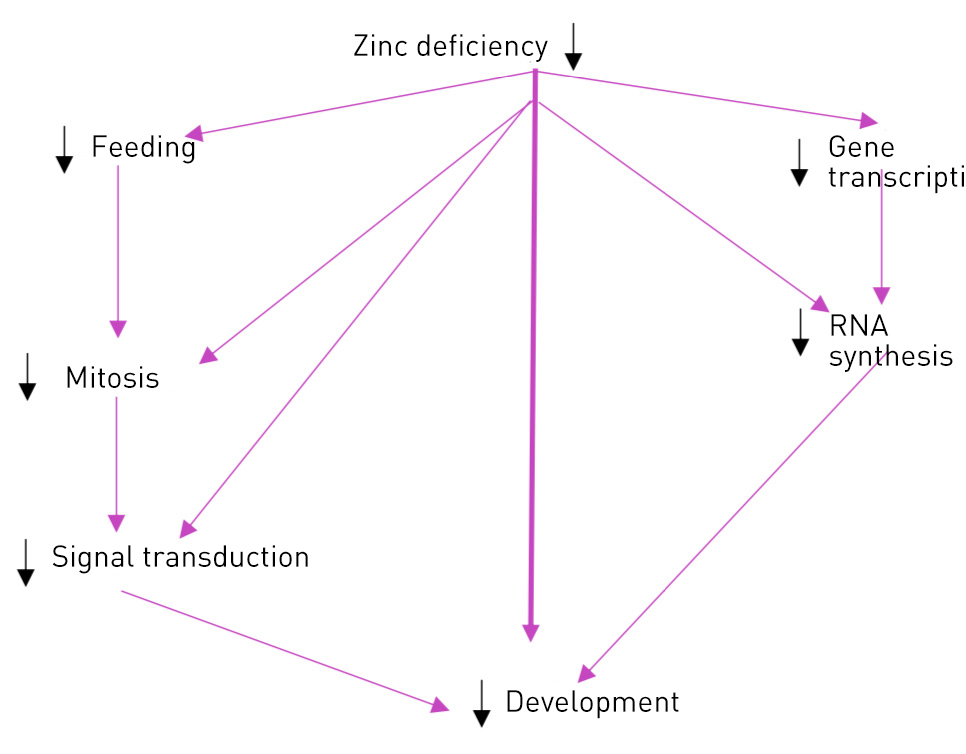

Trace element zinc is applied in various forms in pig feed. As both an essential nutritional ingredient and a pharmacological level to inhibit diarrhea. This article aims to elucidate six different ways in which zinc acts on pigs.
Trace mineral elements provide essential nutrients for various metabolic functions such as growth, development, reproduction, and immunity. Even a slight defect can have adverse effects on the production performance of animals.
Zinc is a trace element that involves various biological functions. It is a very important multifunctional element for maintaining pig health, production, and reproduction. Zinc, as an essential trace element for the synthesis and metabolic functions of nearly 300 biochemical enzymes, is considered to play a crucial role in cell division and the synthesis of DNA and proteins. In addition, zinc cannot be stored in large quantities in the body and needs to be continuously supplied through a diet. This situation is particularly evident in pigs, as their diet is mainly composed of grains, which contain a large amount of phytase and combine with zinc to form insoluble chemical chelates that cannot be absorbed by the intestine.
Zinc oxide supplements zinc in the form of pharmacological doses, which can effectively reduce the occurrence of postweaning diarrhea.
The presence of large amounts of other inorganic elements such as iron, copper, and calcium also hinders the absorption of zinc in the intestine. Recent studies have shown that supplementing zinc in pharmacological doses can reduce weaning stress. Due to the transition period of weaned piglets from dependence on breast milk and sows to different physical and chemical diets, feeding methods, and environmental pressures, these are all the reasons for significant changes in the gastrointestinal tract of piglets.
At present, supplement zinc to breeding pigs with pharmacological dose of zinc oxide (2000-3000ppm) will help reduce the incidence rate of diarrhea after weaning, increase the daily average weight, and produce better disease resistance.
Zinc is a structural component of a large number of proteins, including cellular signaling enzymes and transcription factors. Zinc can regulate cellular signal recognition, second messenger metabolism, protein kinase and protein phosphatase activity. In addition to calcium, phosphorus, and magnesium, zinc is also important for bone formation, as studies have found that zinc deficiency reduces the size of the femur and lowers its strength. It is crucial for cell proliferation and differentiation, especially in regulating DNA synthesis and mitosis. Zinc plays a crucial role in maintaining genomic stability, gene expression, and regulating cell apoptosis. Zinc is an essential part of the DNA repair gene OGG1 that oxidizes guanine. Its imbalance can lead to point mutations and downregulation of gene expression.

The Effect of Zinc Deficiency on Growth Metabolic Processes
Quoting MacDonald, R S. The article "The role of zinc in growth and cell proliferation" published in the Journal of Nutrition in 2000
1.Zinc and the gastrointestinal tract
Zinc is related to the maintenance of function (or gastrointestinal function) from the taste buds of the tongue to the villi and crypts in the intestine. For example, in the intestine, zinc helps maintain the stability of the gut microbiota, diversifying the types of Escherichia coli in weaned piglets, and reducing their susceptibility to Escherichia coli. Further research results indicate that zinc oxide supplementation in the form of pharmacological doses can serve as an antimicrobial agent, while improving gastrointestinal function by increasing mucosal thickness, villus height, and small intestine width.
2.Zinc and enzyme activity
Copper and zinc superoxide dismutases (Cu/ZnSOD) play a crucial role in normal bodily functions. In mammalian tissues, reactive oxygen species such as superoxide radicals, hydroxyl radicals, and hydrogen peroxide are continuously produced during aerobic metabolism. Excessive generation of reactive oxygen species can cause harmful changes. Therefore, these free radicals should be eliminated from the body. Among other enzymes that detoxify free radicals, Cu/ZnSOD is one of the most important enzymes that catalyze the elimination of free radicals.
3.The activity of hormone metabolism
Whether the thyroid gland is in a normal state depends on the presence of many trace elements in the synthesis and metabolism of thyroid hormones. The role of zinc in thyroid metabolism has been studied in animals, but the results are inconsistent. In recent surveys conducted in 2014, it was found that the concentrations of triiodothyronine and thyroxine in pigs with zinc supplementation and zinc deficiency fluctuated between high and low levels.
4.Zinc and Growth
Dietary zinc promotes the growth of livestock by activating various enzyme systems crucial for cell division and proliferation.
5.Zinc and the Reproduction of Pigs
For male animals, zinc plays an important role in spermatogenesis. There are reports that in zinc deficient animals, the development of testicular interstitial cells may be hindered and the production of luteinizing hormone (LH) and testicular steroids may be weakened.
Zinc has a significant impact on the estrus behavior, estrus cycle, and puberty age of sows. However, according to reports provided, zinc still plays a related role in animal reproductive problems such as delayed puberty, low conception rates, implantation failures, and reduced litter size. Zinc plays a crucial role in repairing and maintaining postpartum endometrium and early estrus. Zinc deficient animals have been shown to have lower concentrations of follicle stimulating hormone (FSH) and luteinizing hormone.
6.Zinc and immune system
Zinc plays a crucial role in controlling the immune system, and animals lacking zinc are more susceptible to various pathogens. Zinc affects various aspects of the immune system, from the skin barrier to gene regulation within lymphocytes. Zinc plays a crucial regulatory role in the normal development and function of cells, such as neutrophils and natural killer cells. Zinc deficiency also affects the development of the acquired immune system by inhibiting the growth of T lymphocytes and certain functions such as activating Th1 cytokines and B lymphocytes.